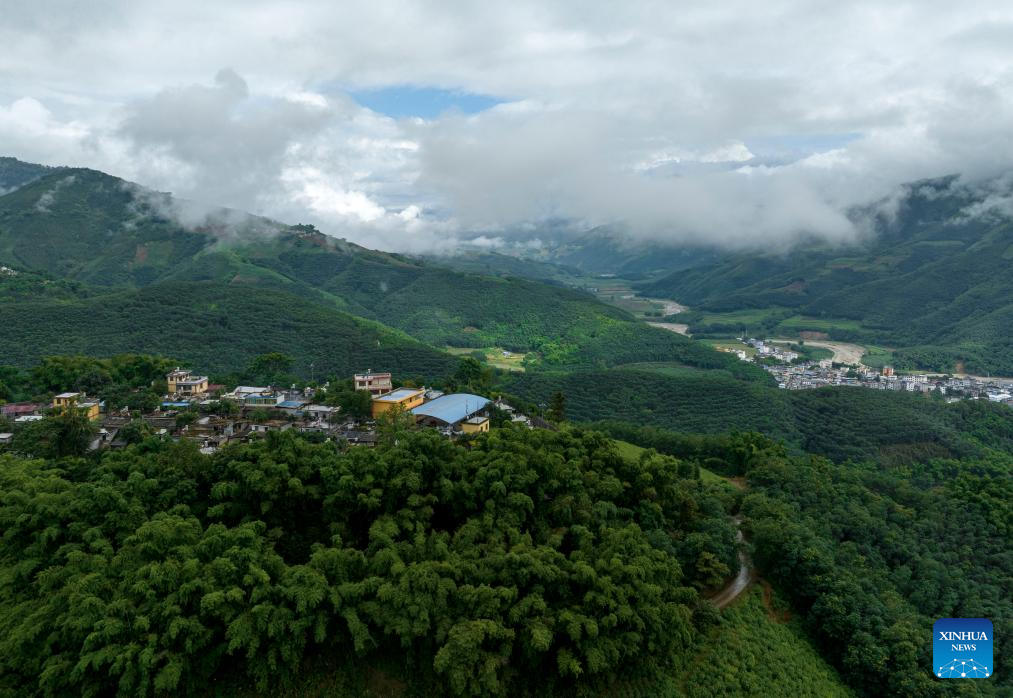
This aerial photo taken on July 23, 2023 shows a view of Shangnami Village in Zhemi Township, Jinping County, Honghe Hani and Yi Autonomous Prefecture, southwest China's Yunnan Province. After days of thinking, Zhang Puzhong decided to do something instructive to his grandchildren: bring them back to the forest he used to live as a child more than 60 years ago.
"This is very important. I know how happy I am today because I never forget how bitter my life was in the past," Zhang said.
Zhang is a 70-year-old Kucong resident in Xiaxinzhai Village, Zhemi Township of Jinping County, Honghe Hani and Yi Autonomous Prefecture, southwest China's Yunnan Province. Kucong ethnic people means "people living on the mountains," an offshoot of the Lahu ethnic group. Yunnan now boasts 30,000 Kucong people, mainly living in the Ailao Mountain area in Zhenyuan and Jinping counties.
Kucong people used to live a primitive life in mountainous regions. A local poet describes traditional Kucong life as "children were left in the dense forest" and "people wearing furs and leaves, eating wild fruit and living in a shed with banana leaves which failed to shelter from the wind and rain." When a place ran out of natural food, they would migrate to another one.
Since the 1950s, supportive policies targeting impoverished ethnic minorities have helped relocate Kucong people to modern communities, with 3,739 Kucong people moving out of the mountains in Jinping from the 1950s to 1963.
The government allocated special funds to buy farm tools, cattle, seeds, rations, clothes and other daily necessities for Kucong people. They were also taught new production techniques, and to get accustomed to paddy rice meals and cloth made of weaved materials.
With tribal life behind them, Kucong people still faced many difficulties, at top of which was deep poverty. Zhang said it was until 1990 did he manage to replace his thatched hut with an adobe house covered in asbestos tiles built with government-granted materials.
Efforts and resources have also been contributed to solve Kucong people's difficulty in dining, housing, schooling, outing, medical service, and so on. The Kucong people, together with the rest of the entire Lahu ethnic group, were lifted out of poverty as scheduled in 2019.
The Zhang family, like many of their neighbors, built a two-story, reinforced concrete building of their own in 2021, in which each family member has a private room. Kucong villagers today are already used to biogas and electric stoves, smart mobile phones, and brick-concrete housing, and some of their younger generations are holders of college degrees. (Xinhua/Yang Zhisen)
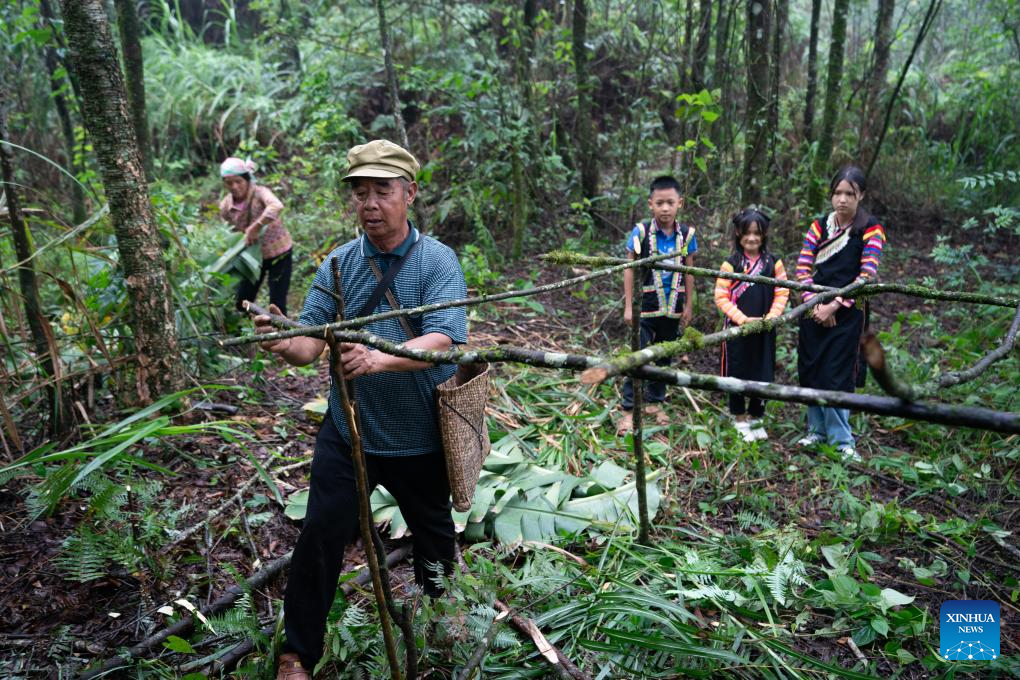
Zhang Puzhong (2nd L) and his wife Wang Suying (1st L) build a shed with banana leaves as their grandchildren look on in the forest near Xiaxinzhai Village, Zhemi Township, Jinping County, Honghe Hani and Yi Autonomous Prefecture, southwest China's Yunnan Province, July 23, 2023. After days of thinking, Zhang Puzhong decided to do something instructive to his grandchildren: bring them back to the forest he used to live as a child more than 60 years ago.
"This is very important. I know how happy I am today because I never forget how bitter my life was in the past," Zhang said.
Zhang is a 70-year-old Kucong resident in Xiaxinzhai Village, Zhemi Township of Jinping County, Honghe Hani and Yi Autonomous Prefecture, southwest China's Yunnan Province. Kucong ethnic people means "people living on the mountains," an offshoot of the Lahu ethnic group. Yunnan now boasts 30,000 Kucong people, mainly living in the Ailao Mountain area in Zhenyuan and Jinping counties.
Kucong people used to live a primitive life in mountainous regions. A local poet describes traditional Kucong life as "children were left in the dense forest" and "people wearing furs and leaves, eating wild fruit and living in a shed with banana leaves which failed to shelter from the wind and rain." When a place ran out of natural food, they would migrate to another one.
Since the 1950s, supportive policies targeting impoverished ethnic minorities have helped relocate Kucong people to modern communities, with 3,739 Kucong people moving out of the mountains in Jinping from the 1950s to 1963.
The government allocated special funds to buy farm tools, cattle, seeds, rations, clothes and other daily necessities for Kucong people. They were also taught new production techniques, and to get accustomed to paddy rice meals and cloth made of weaved materials.
With tribal life behind them, Kucong people still faced many difficulties, at top of which was deep poverty. Zhang said it was until 1990 did he manage to replace his thatched hut with an adobe house covered in asbestos tiles built with government-granted materials.
Efforts and resources have also been contributed to solve Kucong people's difficulty in dining, housing, schooling, outing, medical service, and so on. The Kucong people, together with the rest of the entire Lahu ethnic group, were lifted out of poverty as scheduled in 2019.
The Zhang family, like many of their neighbors, built a two-story, reinforced concrete building of their own in 2021, in which each family member has a private room. Kucong villagers today are already used to biogas and electric stoves, smart mobile phones, and brick-concrete housing, and some of their younger generations are holders of college degrees. (Xinhua/Chen Xinbo)
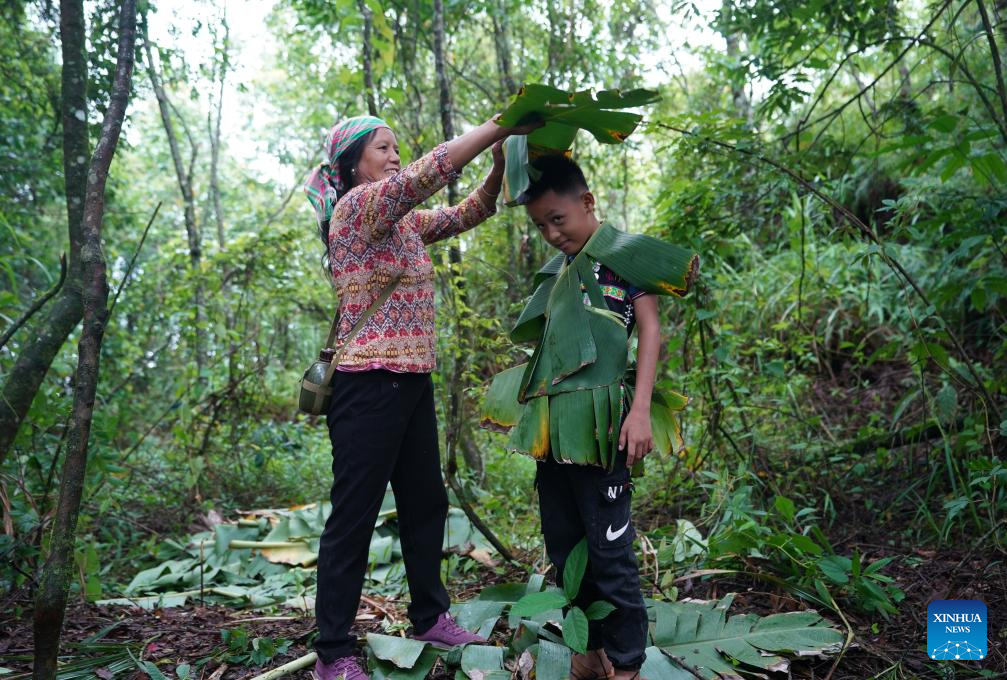
Zhang Puzhong's wife Wang Suying (L) dresses her grandson with banana leaves in the forest near Xiaxinzhai Village, Zhemi Township, Jinping County, Honghe Hani and Yi Autonomous Prefecture, southwest China's Yunnan Province, July 23, 2023. After days of thinking, Zhang Puzhong decided to do something instructive to his grandchildren: bring them back to the forest he used to live as a child more than 60 years ago.
"This is very important. I know how happy I am today because I never forget how bitter my life was in the past," Zhang said.
Zhang is a 70-year-old Kucong resident in Xiaxinzhai Village, Zhemi Township of Jinping County, Honghe Hani and Yi Autonomous Prefecture, southwest China's Yunnan Province. Kucong ethnic people means "people living on the mountains," an offshoot of the Lahu ethnic group. Yunnan now boasts 30,000 Kucong people, mainly living in the Ailao Mountain area in Zhenyuan and Jinping counties.
Kucong people used to live a primitive life in mountainous regions. A local poet describes traditional Kucong life as "children were left in the dense forest" and "people wearing furs and leaves, eating wild fruit and living in a shed with banana leaves which failed to shelter from the wind and rain." When a place ran out of natural food, they would migrate to another one.
Since the 1950s, supportive policies targeting impoverished ethnic minorities have helped relocate Kucong people to modern communities, with 3,739 Kucong people moving out of the mountains in Jinping from the 1950s to 1963.
The government allocated special funds to buy farm tools, cattle, seeds, rations, clothes and other daily necessities for Kucong people. They were also taught new production techniques, and to get accustomed to paddy rice meals and cloth made of weaved materials.
With tribal life behind them, Kucong people still faced many difficulties, at top of which was deep poverty. Zhang said it was until 1990 did he manage to replace his thatched hut with an adobe house covered in asbestos tiles built with government-granted materials.
Efforts and resources have also been contributed to solve Kucong people's difficulty in dining, housing, schooling, outing, medical service, and so on. The Kucong people, together with the rest of the entire Lahu ethnic group, were lifted out of poverty as scheduled in 2019.
The Zhang family, like many of their neighbors, built a two-story, reinforced concrete building of their own in 2021, in which each family member has a private room. Kucong villagers today are already used to biogas and electric stoves, smart mobile phones, and brick-concrete housing, and some of their younger generations are holders of college degrees. (Xinhua/Chen Xinbo)
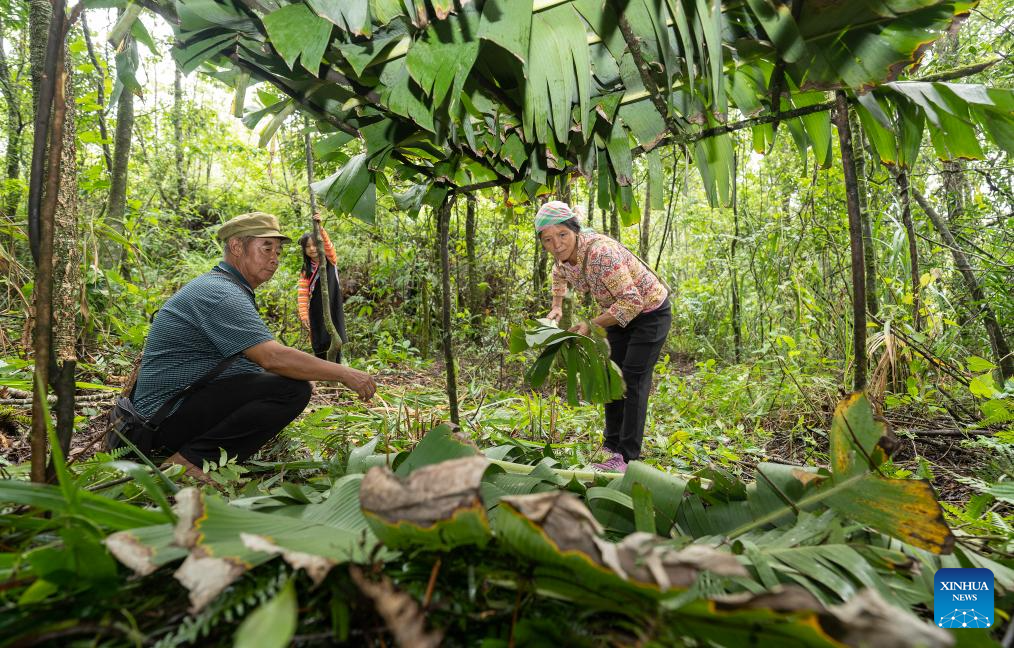
Zhang Puzhong (L) and his wife Wang Suying build a shed with banana leaves in the forest near Xiaxinzhai Village, Zhemi Township, Jinping County, Honghe Hani and Yi Autonomous Prefecture, southwest China's Yunnan Province, July 23, 2023. After days of thinking, Zhang Puzhong decided to do something instructive to his grandchildren: bring them back to the forest he used to live as a child more than 60 years ago.
"This is very important. I know how happy I am today because I never forget how bitter my life was in the past," Zhang said.
Zhang is a 70-year-old Kucong resident in Xiaxinzhai Village, Zhemi Township of Jinping County, Honghe Hani and Yi Autonomous Prefecture, southwest China's Yunnan Province. Kucong ethnic people means "people living on the mountains," an offshoot of the Lahu ethnic group. Yunnan now boasts 30,000 Kucong people, mainly living in the Ailao Mountain area in Zhenyuan and Jinping counties.
Kucong people used to live a primitive life in mountainous regions. A local poet describes traditional Kucong life as "children were left in the dense forest" and "people wearing furs and leaves, eating wild fruit and living in a shed with banana leaves which failed to shelter from the wind and rain." When a place ran out of natural food, they would migrate to another one.
Since the 1950s, supportive policies targeting impoverished ethnic minorities have helped relocate Kucong people to modern communities, with 3,739 Kucong people moving out of the mountains in Jinping from the 1950s to 1963.
The government allocated special funds to buy farm tools, cattle, seeds, rations, clothes and other daily necessities for Kucong people. They were also taught new production techniques, and to get accustomed to paddy rice meals and cloth made of weaved materials.
With tribal life behind them, Kucong people still faced many difficulties, at top of which was deep poverty. Zhang said it was until 1990 did he manage to replace his thatched hut with an adobe house covered in asbestos tiles built with government-granted materials.
Efforts and resources have also been contributed to solve Kucong people's difficulty in dining, housing, schooling, outing, medical service, and so on. The Kucong people, together with the rest of the entire Lahu ethnic group, were lifted out of poverty as scheduled in 2019.
The Zhang family, like many of their neighbors, built a two-story, reinforced concrete building of their own in 2021, in which each family member has a private room. Kucong villagers today are already used to biogas and electric stoves, smart mobile phones, and brick-concrete housing, and some of their younger generations are holders of college degrees. (Xinhua/Fei Maohua)
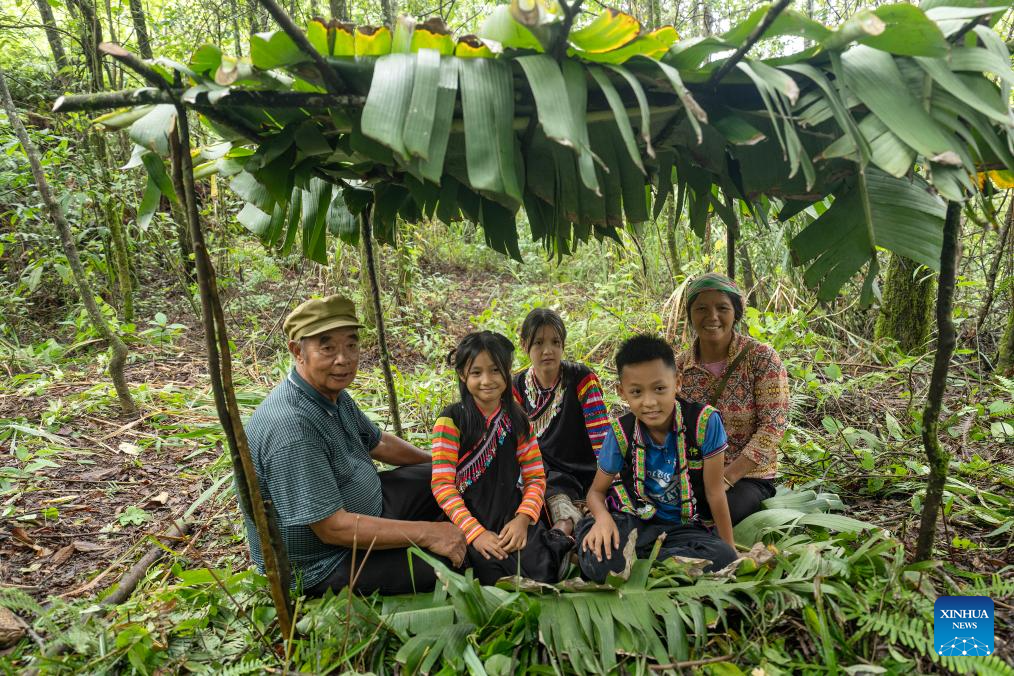
Zhang Puzhong (1st L), his wife Wang Suying (1st R) and their grandchildren pose for a photo under a banana leaf shed in the forest near Xiaxinzhai Village, Zhemi Township, Jinping County, Honghe Hani and Yi Autonomous Prefecture, southwest China's Yunnan Province, July 23, 2023. After days of thinking, Zhang Puzhong decided to do something instructive to his grandchildren: bring them back to the forest he used to live as a child more than 60 years ago.
"This is very important. I know how happy I am today because I never forget how bitter my life was in the past," Zhang said.
Zhang is a 70-year-old Kucong resident in Xiaxinzhai Village, Zhemi Township of Jinping County, Honghe Hani and Yi Autonomous Prefecture, southwest China's Yunnan Province. Kucong ethnic people means "people living on the mountains," an offshoot of the Lahu ethnic group. Yunnan now boasts 30,000 Kucong people, mainly living in the Ailao Mountain area in Zhenyuan and Jinping counties.
Kucong people used to live a primitive life in mountainous regions. A local poet describes traditional Kucong life as "children were left in the dense forest" and "people wearing furs and leaves, eating wild fruit and living in a shed with banana leaves which failed to shelter from the wind and rain." When a place ran out of natural food, they would migrate to another one.
Since the 1950s, supportive policies targeting impoverished ethnic minorities have helped relocate Kucong people to modern communities, with 3,739 Kucong people moving out of the mountains in Jinping from the 1950s to 1963.
The government allocated special funds to buy farm tools, cattle, seeds, rations, clothes and other daily necessities for Kucong people. They were also taught new production techniques, and to get accustomed to paddy rice meals and cloth made of weaved materials.
With tribal life behind them, Kucong people still faced many difficulties, at top of which was deep poverty. Zhang said it was until 1990 did he manage to replace his thatched hut with an adobe house covered in asbestos tiles built with government-granted materials.
Efforts and resources have also been contributed to solve Kucong people's difficulty in dining, housing, schooling, outing, medical service, and so on. The Kucong people, together with the rest of the entire Lahu ethnic group, were lifted out of poverty as scheduled in 2019.
The Zhang family, like many of their neighbors, built a two-story, reinforced concrete building of their own in 2021, in which each family member has a private room. Kucong villagers today are already used to biogas and electric stoves, smart mobile phones, and brick-concrete housing, and some of their younger generations are holders of college degrees. (Xinhua/Fei Maohua)
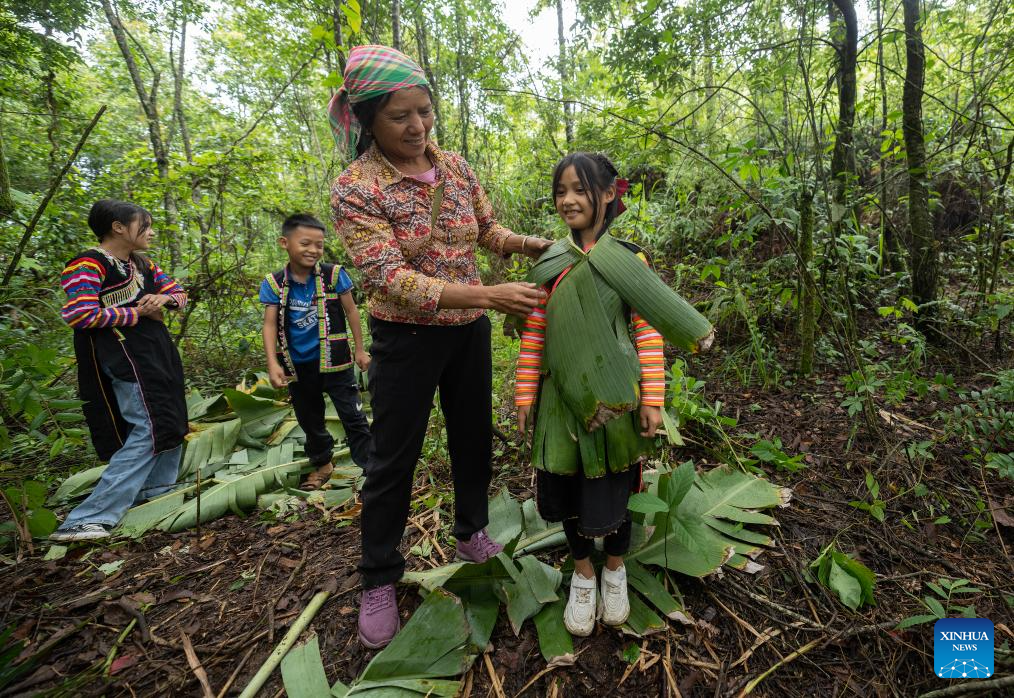
Zhang Puzhong's wife Wang Suying (2nd R) dresses her granddaughter with banana leaves in the forest near Xiaxinzhai Village, Zhemi Township, Jinping County, Honghe Hani and Yi Autonomous Prefecture, southwest China's Yunnan Province, July 23, 2023. After days of thinking, Zhang Puzhong decided to do something instructive to his grandchildren: bring them back to the forest he used to live as a child more than 60 years ago.
"This is very important. I know how happy I am today because I never forget how bitter my life was in the past," Zhang said.
Zhang is a 70-year-old Kucong resident in Xiaxinzhai Village, Zhemi Township of Jinping County, Honghe Hani and Yi Autonomous Prefecture, southwest China's Yunnan Province. Kucong ethnic people means "people living on the mountains," an offshoot of the Lahu ethnic group. Yunnan now boasts 30,000 Kucong people, mainly living in the Ailao Mountain area in Zhenyuan and Jinping counties.
Kucong people used to live a primitive life in mountainous regions. A local poet describes traditional Kucong life as "children were left in the dense forest" and "people wearing furs and leaves, eating wild fruit and living in a shed with banana leaves which failed to shelter from the wind and rain." When a place ran out of natural food, they would migrate to another one.
Since the 1950s, supportive policies targeting impoverished ethnic minorities have helped relocate Kucong people to modern communities, with 3,739 Kucong people moving out of the mountains in Jinping from the 1950s to 1963.
The government allocated special funds to buy farm tools, cattle, seeds, rations, clothes and other daily necessities for Kucong people. They were also taught new production techniques, and to get accustomed to paddy rice meals and cloth made of weaved materials.
With tribal life behind them, Kucong people still faced many difficulties, at top of which was deep poverty. Zhang said it was until 1990 did he manage to replace his thatched hut with an adobe house covered in asbestos tiles built with government-granted materials.
Efforts and resources have also been contributed to solve Kucong people's difficulty in dining, housing, schooling, outing, medical service, and so on. The Kucong people, together with the rest of the entire Lahu ethnic group, were lifted out of poverty as scheduled in 2019.
The Zhang family, like many of their neighbors, built a two-story, reinforced concrete building of their own in 2021, in which each family member has a private room. Kucong villagers today are already used to biogas and electric stoves, smart mobile phones, and brick-concrete housing, and some of their younger generations are holders of college degrees. (Xinhua/Fei Maohua)
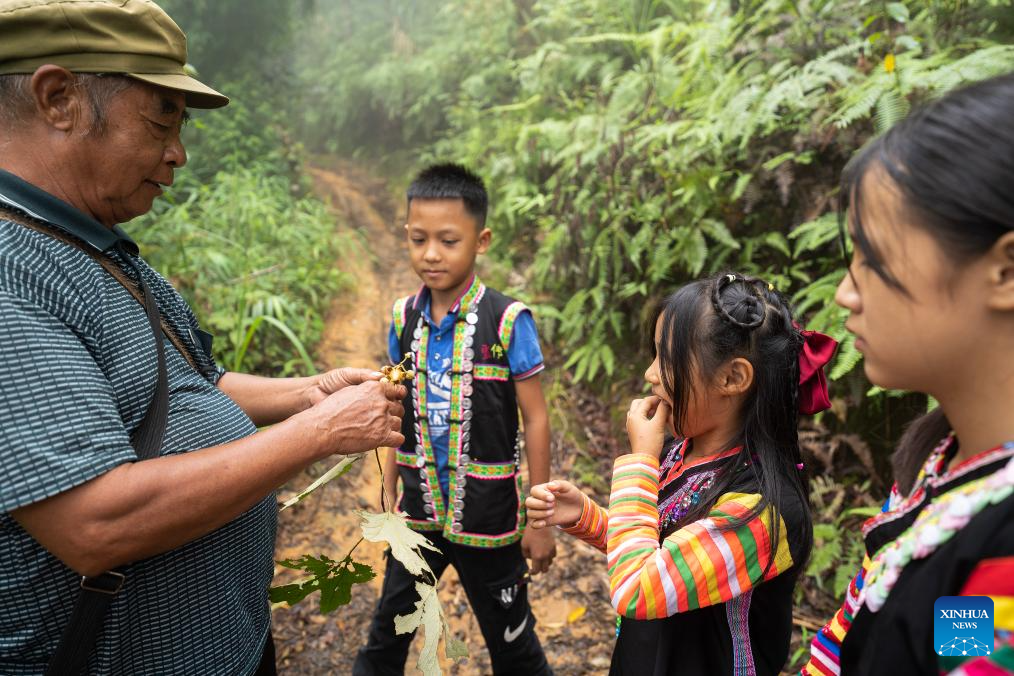
Zhang Puzhong (1st L) picks some wild berries for his grandchildren in the forest near Xiaxinzhai Village, Zhemi Township, Jinping County, Honghe Hani and Yi Autonomous Prefecture, southwest China's Yunnan Province, July 23, 2023. After days of thinking, Zhang Puzhong decided to do something instructive to his grandchildren: bring them back to the forest he used to live as a child more than 60 years ago.
"This is very important. I know how happy I am today because I never forget how bitter my life was in the past," Zhang said.
Zhang is a 70-year-old Kucong resident in Xiaxinzhai Village, Zhemi Township of Jinping County, Honghe Hani and Yi Autonomous Prefecture, southwest China's Yunnan Province. Kucong ethnic people means "people living on the mountains," an offshoot of the Lahu ethnic group. Yunnan now boasts 30,000 Kucong people, mainly living in the Ailao Mountain area in Zhenyuan and Jinping counties.
Kucong people used to live a primitive life in mountainous regions. A local poet describes traditional Kucong life as "children were left in the dense forest" and "people wearing furs and leaves, eating wild fruit and living in a shed with banana leaves which failed to shelter from the wind and rain." When a place ran out of natural food, they would migrate to another one.
Since the 1950s, supportive policies targeting impoverished ethnic minorities have helped relocate Kucong people to modern communities, with 3,739 Kucong people moving out of the mountains in Jinping from the 1950s to 1963.
The government allocated special funds to buy farm tools, cattle, seeds, rations, clothes and other daily necessities for Kucong people. They were also taught new production techniques, and to get accustomed to paddy rice meals and cloth made of weaved materials.
With tribal life behind them, Kucong people still faced many difficulties, at top of which was deep poverty. Zhang said it was until 1990 did he manage to replace his thatched hut with an adobe house covered in asbestos tiles built with government-granted materials.
Efforts and resources have also been contributed to solve Kucong people's difficulty in dining, housing, schooling, outing, medical service, and so on. The Kucong people, together with the rest of the entire Lahu ethnic group, were lifted out of poverty as scheduled in 2019.
The Zhang family, like many of their neighbors, built a two-story, reinforced concrete building of their own in 2021, in which each family member has a private room. Kucong villagers today are already used to biogas and electric stoves, smart mobile phones, and brick-concrete housing, and some of their younger generations are holders of college degrees. (Xinhua/Fei Maohua)
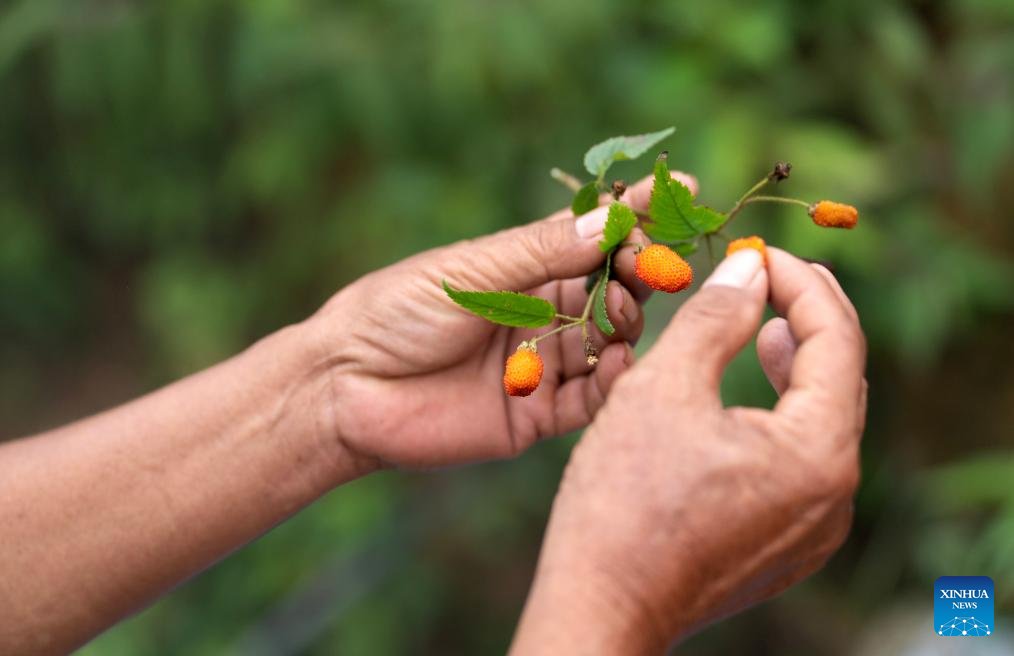
Zhang Puzhong picks some wild berries for his grandchildren in the forest near Xiaxinzhai Village, Zhemi Township, Jinping County, Honghe Hani and Yi Autonomous Prefecture, southwest China's Yunnan Province, July 23, 2023. After days of thinking, Zhang Puzhong decided to do something instructive to his grandchildren: bring them back to the forest he used to live as a child more than 60 years ago.
"This is very important. I know how happy I am today because I never forget how bitter my life was in the past," Zhang said.
Zhang is a 70-year-old Kucong resident in Xiaxinzhai Village, Zhemi Township of Jinping County, Honghe Hani and Yi Autonomous Prefecture, southwest China's Yunnan Province. Kucong ethnic people means "people living on the mountains," an offshoot of the Lahu ethnic group. Yunnan now boasts 30,000 Kucong people, mainly living in the Ailao Mountain area in Zhenyuan and Jinping counties.
Kucong people used to live a primitive life in mountainous regions. A local poet describes traditional Kucong life as "children were left in the dense forest" and "people wearing furs and leaves, eating wild fruit and living in a shed with banana leaves which failed to shelter from the wind and rain." When a place ran out of natural food, they would migrate to another one.
Since the 1950s, supportive policies targeting impoverished ethnic minorities have helped relocate Kucong people to modern communities, with 3,739 Kucong people moving out of the mountains in Jinping from the 1950s to 1963.
The government allocated special funds to buy farm tools, cattle, seeds, rations, clothes and other daily necessities for Kucong people. They were also taught new production techniques, and to get accustomed to paddy rice meals and cloth made of weaved materials.
With tribal life behind them, Kucong people still faced many difficulties, at top of which was deep poverty. Zhang said it was until 1990 did he manage to replace his thatched hut with an adobe house covered in asbestos tiles built with government-granted materials.
Efforts and resources have also been contributed to solve Kucong people's difficulty in dining, housing, schooling, outing, medical service, and so on. The Kucong people, together with the rest of the entire Lahu ethnic group, were lifted out of poverty as scheduled in 2019.
The Zhang family, like many of their neighbors, built a two-story, reinforced concrete building of their own in 2021, in which each family member has a private room. Kucong villagers today are already used to biogas and electric stoves, smart mobile phones, and brick-concrete housing, and some of their younger generations are holders of college degrees. (Xinhua/Fei Maohua)
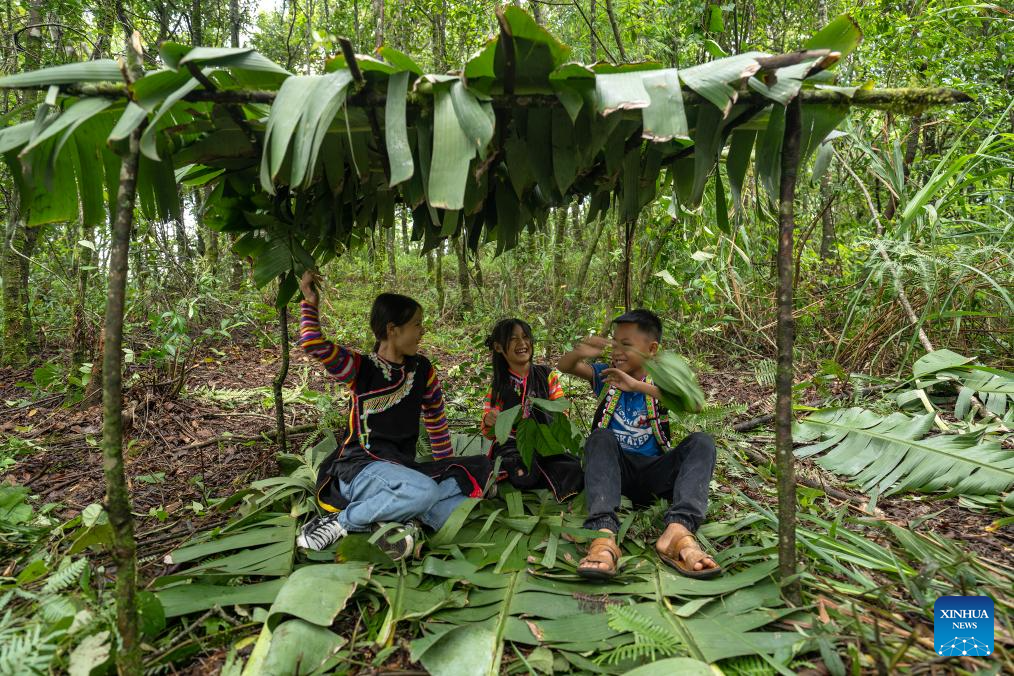
Grandchildren of Zhang Puzhong have fun under a banana leaf shed built by Zhang in the forest near Xiaxinzhai Village, Zhemi Township, Jinping County, Honghe Hani and Yi Autonomous Prefecture, southwest China's Yunnan Province, July 23, 2023. After days of thinking, Zhang Puzhong decided to do something instructive to his grandchildren: bring them back to the forest he used to live as a child more than 60 years ago.
"This is very important. I know how happy I am today because I never forget how bitter my life was in the past," Zhang said.
Zhang is a 70-year-old Kucong resident in Xiaxinzhai Village, Zhemi Township of Jinping County, Honghe Hani and Yi Autonomous Prefecture, southwest China's Yunnan Province. Kucong ethnic people means "people living on the mountains," an offshoot of the Lahu ethnic group. Yunnan now boasts 30,000 Kucong people, mainly living in the Ailao Mountain area in Zhenyuan and Jinping counties.
Kucong people used to live a primitive life in mountainous regions. A local poet describes traditional Kucong life as "children were left in the dense forest" and "people wearing furs and leaves, eating wild fruit and living in a shed with banana leaves which failed to shelter from the wind and rain." When a place ran out of natural food, they would migrate to another one.
Since the 1950s, supportive policies targeting impoverished ethnic minorities have helped relocate Kucong people to modern communities, with 3,739 Kucong people moving out of the mountains in Jinping from the 1950s to 1963.
The government allocated special funds to buy farm tools, cattle, seeds, rations, clothes and other daily necessities for Kucong people. They were also taught new production techniques, and to get accustomed to paddy rice meals and cloth made of weaved materials.
With tribal life behind them, Kucong people still faced many difficulties, at top of which was deep poverty. Zhang said it was until 1990 did he manage to replace his thatched hut with an adobe house covered in asbestos tiles built with government-granted materials.
Efforts and resources have also been contributed to solve Kucong people's difficulty in dining, housing, schooling, outing, medical service, and so on. The Kucong people, together with the rest of the entire Lahu ethnic group, were lifted out of poverty as scheduled in 2019.
The Zhang family, like many of their neighbors, built a two-story, reinforced concrete building of their own in 2021, in which each family member has a private room. Kucong villagers today are already used to biogas and electric stoves, smart mobile phones, and brick-concrete housing, and some of their younger generations are holders of college degrees. (Xinhua/Fei Maohua)
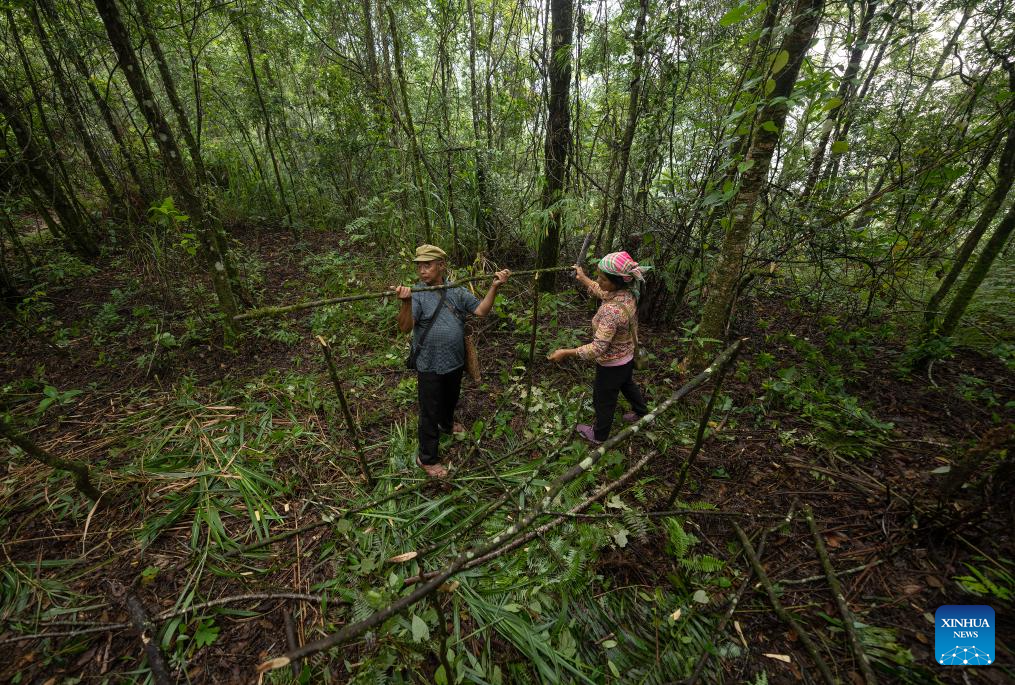
Zhang Puzhong (L) and his wife Wang Suying build a shed with banana leaves in the forest near Xiaxinzhai Village, Zhemi Township, Jinping County, Honghe Hani and Yi Autonomous Prefecture, southwest China's Yunnan Province, July 23, 2023. After days of thinking, Zhang Puzhong decided to do something instructive to his grandchildren: bring them back to the forest he used to live as a child more than 60 years ago.
"This is very important. I know how happy I am today because I never forget how bitter my life was in the past," Zhang said.
Zhang is a 70-year-old Kucong resident in Xiaxinzhai Village, Zhemi Township of Jinping County, Honghe Hani and Yi Autonomous Prefecture, southwest China's Yunnan Province. Kucong ethnic people means "people living on the mountains," an offshoot of the Lahu ethnic group. Yunnan now boasts 30,000 Kucong people, mainly living in the Ailao Mountain area in Zhenyuan and Jinping counties.
Kucong people used to live a primitive life in mountainous regions. A local poet describes traditional Kucong life as "children were left in the dense forest" and "people wearing furs and leaves, eating wild fruit and living in a shed with banana leaves which failed to shelter from the wind and rain." When a place ran out of natural food, they would migrate to another one.
Since the 1950s, supportive policies targeting impoverished ethnic minorities have helped relocate Kucong people to modern communities, with 3,739 Kucong people moving out of the mountains in Jinping from the 1950s to 1963.
The government allocated special funds to buy farm tools, cattle, seeds, rations, clothes and other daily necessities for Kucong people. They were also taught new production techniques, and to get accustomed to paddy rice meals and cloth made of weaved materials.
With tribal life behind them, Kucong people still faced many difficulties, at top of which was deep poverty. Zhang said it was until 1990 did he manage to replace his thatched hut with an adobe house covered in asbestos tiles built with government-granted materials.
Efforts and resources have also been contributed to solve Kucong people's difficulty in dining, housing, schooling, outing, medical service, and so on. The Kucong people, together with the rest of the entire Lahu ethnic group, were lifted out of poverty as scheduled in 2019.
The Zhang family, like many of their neighbors, built a two-story, reinforced concrete building of their own in 2021, in which each family member has a private room. Kucong villagers today are already used to biogas and electric stoves, smart mobile phones, and brick-concrete housing, and some of their younger generations are holders of college degrees. (Xinhua/Fei Maohua)
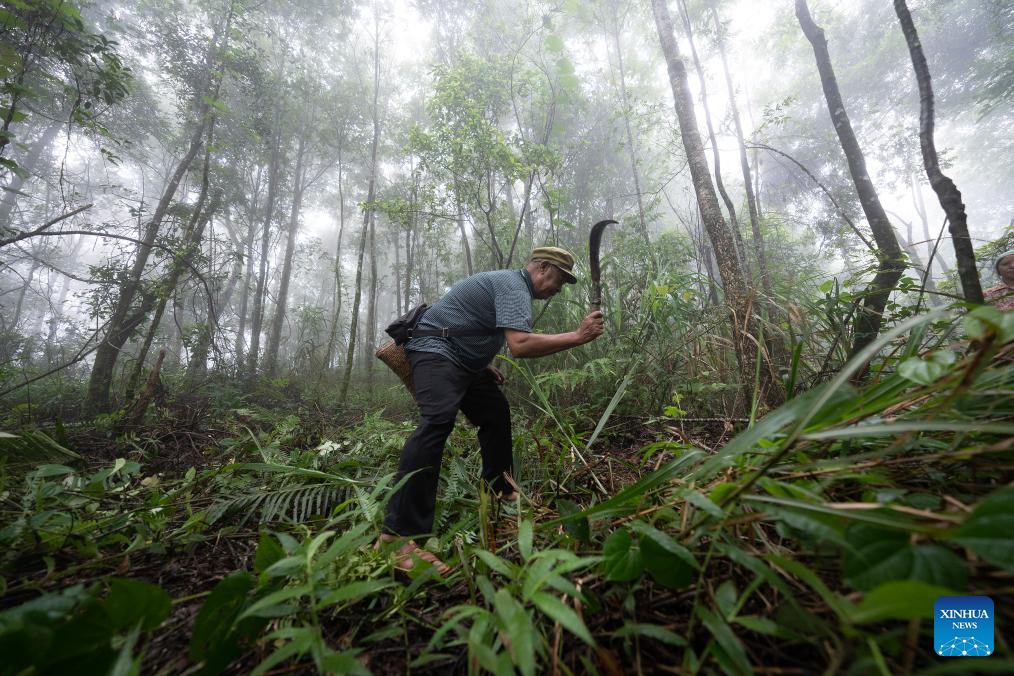
Zhang Puzhong clears vines and bushes as he travels in the forest near Xiaxinzhai Village, Zhemi Township, Jinping County, Honghe Hani and Yi Autonomous Prefecture, southwest China's Yunnan Province, July 23, 2023. After days of thinking, Zhang Puzhong decided to do something instructive to his grandchildren: bring them back to the forest he used to live as a child more than 60 years ago.
"This is very important. I know how happy I am today because I never forget how bitter my life was in the past," Zhang said.
Zhang is a 70-year-old Kucong resident in Xiaxinzhai Village, Zhemi Township of Jinping County, Honghe Hani and Yi Autonomous Prefecture, southwest China's Yunnan Province. Kucong ethnic people means "people living on the mountains," an offshoot of the Lahu ethnic group. Yunnan now boasts 30,000 Kucong people, mainly living in the Ailao Mountain area in Zhenyuan and Jinping counties.
Kucong people used to live a primitive life in mountainous regions. A local poet describes traditional Kucong life as "children were left in the dense forest" and "people wearing furs and leaves, eating wild fruit and living in a shed with banana leaves which failed to shelter from the wind and rain." When a place ran out of natural food, they would migrate to another one.
Since the 1950s, supportive policies targeting impoverished ethnic minorities have helped relocate Kucong people to modern communities, with 3,739 Kucong people moving out of the mountains in Jinping from the 1950s to 1963.
The government allocated special funds to buy farm tools, cattle, seeds, rations, clothes and other daily necessities for Kucong people. They were also taught new production techniques, and to get accustomed to paddy rice meals and cloth made of weaved materials.
With tribal life behind them, Kucong people still faced many difficulties, at top of which was deep poverty. Zhang said it was until 1990 did he manage to replace his thatched hut with an adobe house covered in asbestos tiles built with government-granted materials.
Efforts and resources have also been contributed to solve Kucong people's difficulty in dining, housing, schooling, outing, medical service, and so on. The Kucong people, together with the rest of the entire Lahu ethnic group, were lifted out of poverty as scheduled in 2019.
The Zhang family, like many of their neighbors, built a two-story, reinforced concrete building of their own in 2021, in which each family member has a private room. Kucong villagers today are already used to biogas and electric stoves, smart mobile phones, and brick-concrete housing, and some of their younger generations are holders of college degrees. (Xinhua/Fei Maohua)
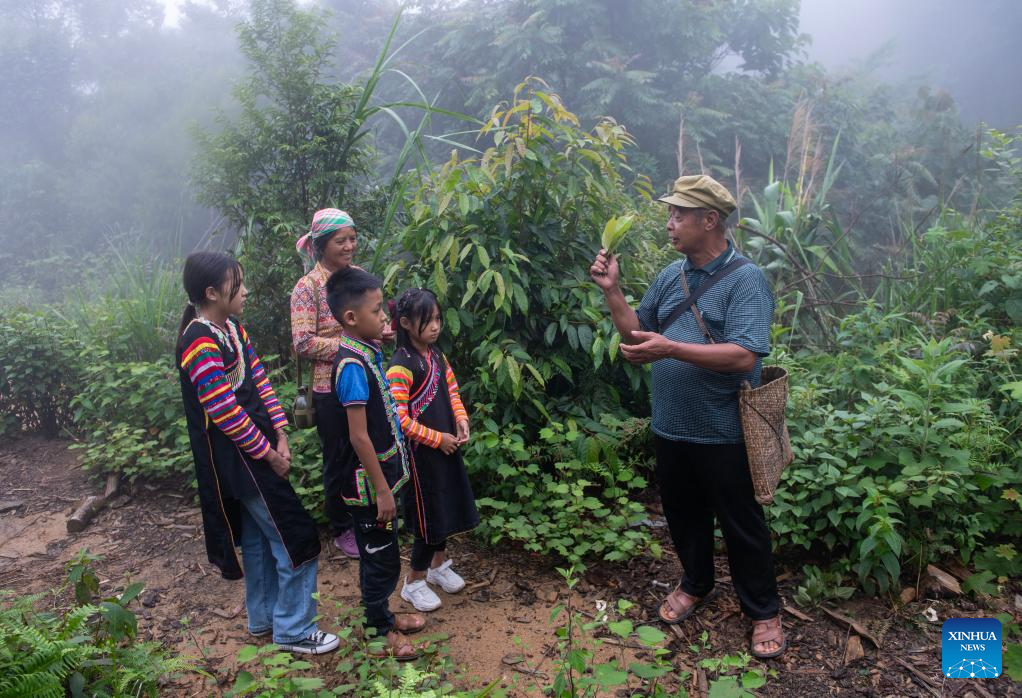
Zhang Puzhong (1st R) briefs his grandchildren on herbal medicines in the forest near Xiaxinzhai Village, Zhemi Township, Jinping County, Honghe Hani and Yi Autonomous Prefecture, southwest China's Yunnan Province, July 23, 2023. After days of thinking, Zhang Puzhong decided to do something instructive to his grandchildren: bring them back to the forest he used to live as a child more than 60 years ago.
"This is very important. I know how happy I am today because I never forget how bitter my life was in the past," Zhang said.
Zhang is a 70-year-old Kucong resident in Xiaxinzhai Village, Zhemi Township of Jinping County, Honghe Hani and Yi Autonomous Prefecture, southwest China's Yunnan Province. Kucong ethnic people means "people living on the mountains," an offshoot of the Lahu ethnic group. Yunnan now boasts 30,000 Kucong people, mainly living in the Ailao Mountain area in Zhenyuan and Jinping counties.
Kucong people used to live a primitive life in mountainous regions. A local poet describes traditional Kucong life as "children were left in the dense forest" and "people wearing furs and leaves, eating wild fruit and living in a shed with banana leaves which failed to shelter from the wind and rain." When a place ran out of natural food, they would migrate to another one.
Since the 1950s, supportive policies targeting impoverished ethnic minorities have helped relocate Kucong people to modern communities, with 3,739 Kucong people moving out of the mountains in Jinping from the 1950s to 1963.
The government allocated special funds to buy farm tools, cattle, seeds, rations, clothes and other daily necessities for Kucong people. They were also taught new production techniques, and to get accustomed to paddy rice meals and cloth made of weaved materials.
With tribal life behind them, Kucong people still faced many difficulties, at top of which was deep poverty. Zhang said it was until 1990 did he manage to replace his thatched hut with an adobe house covered in asbestos tiles built with government-granted materials.
Efforts and resources have also been contributed to solve Kucong people's difficulty in dining, housing, schooling, outing, medical service, and so on. The Kucong people, together with the rest of the entire Lahu ethnic group, were lifted out of poverty as scheduled in 2019.
The Zhang family, like many of their neighbors, built a two-story, reinforced concrete building of their own in 2021, in which each family member has a private room. Kucong villagers today are already used to biogas and electric stoves, smart mobile phones, and brick-concrete housing, and some of their younger generations are holders of college degrees. (Xinhua/Chen Xinbo)
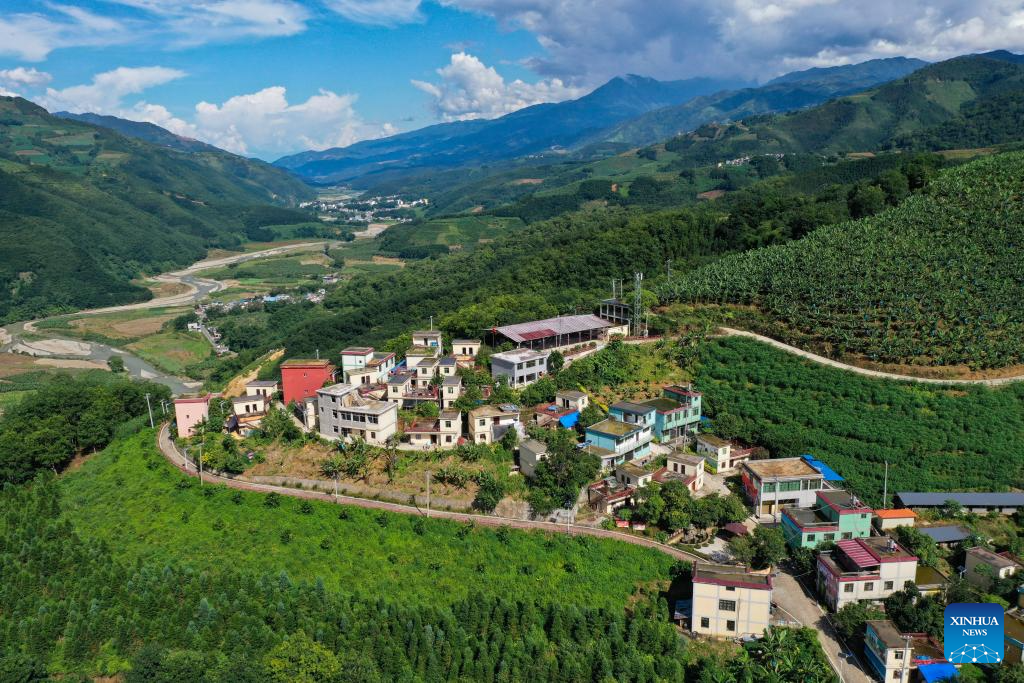
This aerial photo taken on July 23, 2023 shows a view of a relocation site for Kucong people in Zhemi Township, Jinping County, Honghe Hani and Yi Autonomous Prefecture, southwest China's Yunnan Province. After days of thinking, Zhang Puzhong decided to do something instructive to his grandchildren: bring them back to the forest he used to live as a child more than 60 years ago.
"This is very important. I know how happy I am today because I never forget how bitter my life was in the past," Zhang said.
Zhang is a 70-year-old Kucong resident in Xiaxinzhai Village, Zhemi Township of Jinping County, Honghe Hani and Yi Autonomous Prefecture, southwest China's Yunnan Province. Kucong ethnic people means "people living on the mountains," an offshoot of the Lahu ethnic group. Yunnan now boasts 30,000 Kucong people, mainly living in the Ailao Mountain area in Zhenyuan and Jinping counties.
Kucong people used to live a primitive life in mountainous regions. A local poet describes traditional Kucong life as "children were left in the dense forest" and "people wearing furs and leaves, eating wild fruit and living in a shed with banana leaves which failed to shelter from the wind and rain." When a place ran out of natural food, they would migrate to another one.
Since the 1950s, supportive policies targeting impoverished ethnic minorities have helped relocate Kucong people to modern communities, with 3,739 Kucong people moving out of the mountains in Jinping from the 1950s to 1963.
The government allocated special funds to buy farm tools, cattle, seeds, rations, clothes and other daily necessities for Kucong people. They were also taught new production techniques, and to get accustomed to paddy rice meals and cloth made of weaved materials.
With tribal life behind them, Kucong people still faced many difficulties, at top of which was deep poverty. Zhang said it was until 1990 did he manage to replace his thatched hut with an adobe house covered in asbestos tiles built with government-granted materials.
Efforts and resources have also been contributed to solve Kucong people's difficulty in dining, housing, schooling, outing, medical service, and so on. The Kucong people, together with the rest of the entire Lahu ethnic group, were lifted out of poverty as scheduled in 2019.
The Zhang family, like many of their neighbors, built a two-story, reinforced concrete building of their own in 2021, in which each family member has a private room. Kucong villagers today are already used to biogas and electric stoves, smart mobile phones, and brick-concrete housing, and some of their younger generations are holders of college degrees. (Xinhua/Chen Xinbo)
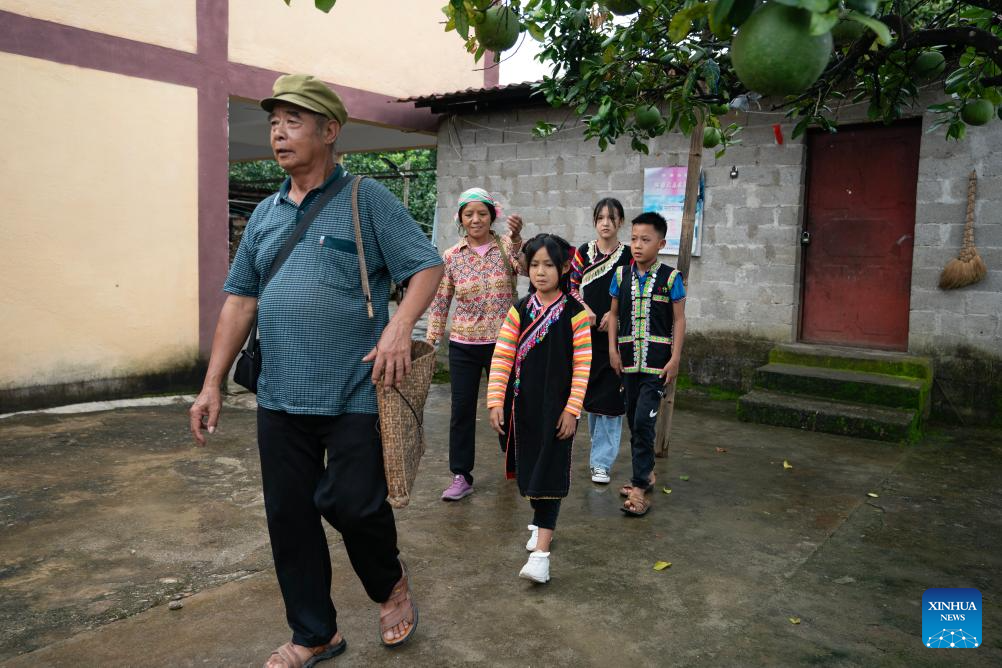
Zhang Puzhong (1st L), together with his wife Wang Suying and their grandchildren, is ready for a tour to the forest in Xiaxinzhai Village, Zhemi Township, Jinping County, Honghe Hani and Yi Autonomous Prefecture, southwest China's Yunnan Province, July 23, 2023. After days of thinking, Zhang Puzhong decided to do something instructive to his grandchildren: bring them back to the forest he used to live as a child more than 60 years ago.
"This is very important. I know how happy I am today because I never forget how bitter my life was in the past," Zhang said.
Zhang is a 70-year-old Kucong resident in Xiaxinzhai Village, Zhemi Township of Jinping County, Honghe Hani and Yi Autonomous Prefecture, southwest China's Yunnan Province. Kucong ethnic people means "people living on the mountains," an offshoot of the Lahu ethnic group. Yunnan now boasts 30,000 Kucong people, mainly living in the Ailao Mountain area in Zhenyuan and Jinping counties.
Kucong people used to live a primitive life in mountainous regions. A local poet describes traditional Kucong life as "children were left in the dense forest" and "people wearing furs and leaves, eating wild fruit and living in a shed with banana leaves which failed to shelter from the wind and rain." When a place ran out of natural food, they would migrate to another one.
Since the 1950s, supportive policies targeting impoverished ethnic minorities have helped relocate Kucong people to modern communities, with 3,739 Kucong people moving out of the mountains in Jinping from the 1950s to 1963.
The government allocated special funds to buy farm tools, cattle, seeds, rations, clothes and other daily necessities for Kucong people. They were also taught new production techniques, and to get accustomed to paddy rice meals and cloth made of weaved materials.
With tribal life behind them, Kucong people still faced many difficulties, at top of which was deep poverty. Zhang said it was until 1990 did he manage to replace his thatched hut with an adobe house covered in asbestos tiles built with government-granted materials.
Efforts and resources have also been contributed to solve Kucong people's difficulty in dining, housing, schooling, outing, medical service, and so on. The Kucong people, together with the rest of the entire Lahu ethnic group, were lifted out of poverty as scheduled in 2019.
The Zhang family, like many of their neighbors, built a two-story, reinforced concrete building of their own in 2021, in which each family member has a private room. Kucong villagers today are already used to biogas and electric stoves, smart mobile phones, and brick-concrete housing, and some of their younger generations are holders of college degrees. (Xinhua/Chen Xinbo)
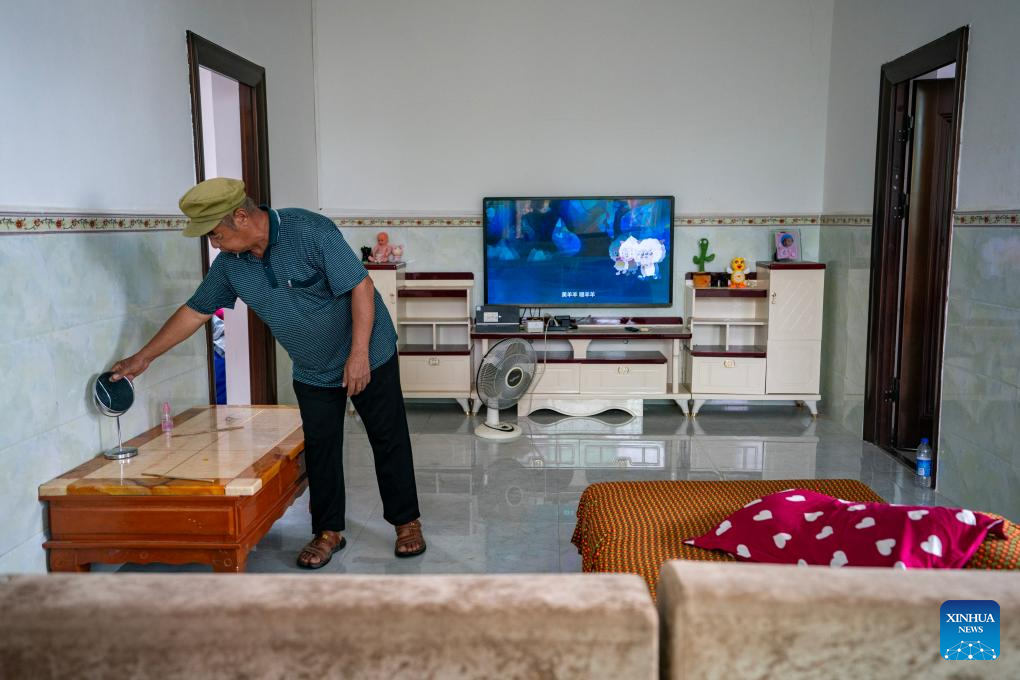
Zhang Puzhong does housekeeping in the sitting room of his residence before a tour to the forest in Xiaxinzhai Village, Zhemi Township, Jinping County, Honghe Hani and Yi Autonomous Prefecture, southwest China's Yunnan Province, July 23, 2023. After days of thinking, Zhang Puzhong decided to do something instructive to his grandchildren: bring them back to the forest he used to live as a child more than 60 years ago.
"This is very important. I know how happy I am today because I never forget how bitter my life was in the past," Zhang said.
Zhang is a 70-year-old Kucong resident in Xiaxinzhai Village, Zhemi Township of Jinping County, Honghe Hani and Yi Autonomous Prefecture, southwest China's Yunnan Province. Kucong ethnic people means "people living on the mountains," an offshoot of the Lahu ethnic group. Yunnan now boasts 30,000 Kucong people, mainly living in the Ailao Mountain area in Zhenyuan and Jinping counties.
Kucong people used to live a primitive life in mountainous regions. A local poet describes traditional Kucong life as "children were left in the dense forest" and "people wearing furs and leaves, eating wild fruit and living in a shed with banana leaves which failed to shelter from the wind and rain." When a place ran out of natural food, they would migrate to another one.
Since the 1950s, supportive policies targeting impoverished ethnic minorities have helped relocate Kucong people to modern communities, with 3,739 Kucong people moving out of the mountains in Jinping from the 1950s to 1963.
The government allocated special funds to buy farm tools, cattle, seeds, rations, clothes and other daily necessities for Kucong people. They were also taught new production techniques, and to get accustomed to paddy rice meals and cloth made of weaved materials.
With tribal life behind them, Kucong people still faced many difficulties, at top of which was deep poverty. Zhang said it was until 1990 did he manage to replace his thatched hut with an adobe house covered in asbestos tiles built with government-granted materials.
Efforts and resources have also been contributed to solve Kucong people's difficulty in dining, housing, schooling, outing, medical service, and so on. The Kucong people, together with the rest of the entire Lahu ethnic group, were lifted out of poverty as scheduled in 2019.
The Zhang family, like many of their neighbors, built a two-story, reinforced concrete building of their own in 2021, in which each family member has a private room. Kucong villagers today are already used to biogas and electric stoves, smart mobile phones, and brick-concrete housing, and some of their younger generations are holders of college degrees. (Xinhua/Chen Xinbo)
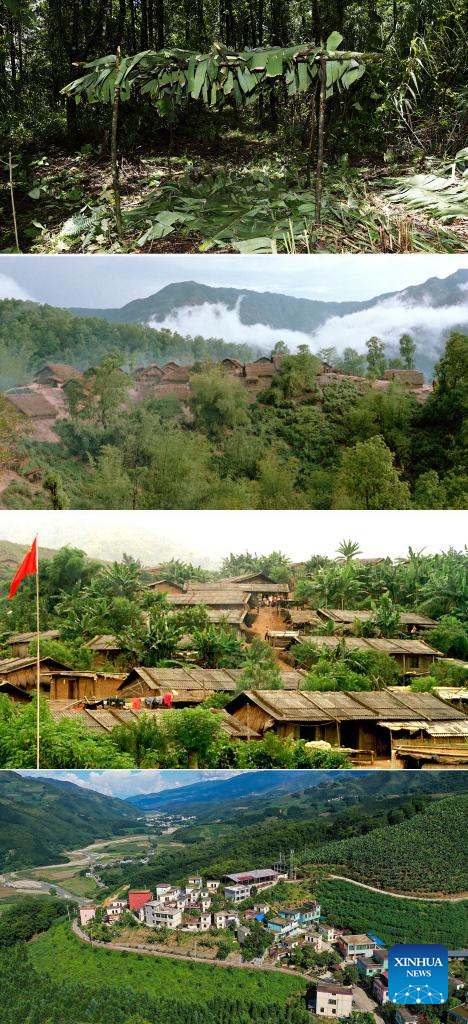
This combo photo shows the changes in housing conditions of Kucong people: the banana leaf shed built by Zhang Puzhong based on his memory of Kucong people's primitive life in the forest taken on July 23, 2023 (top, Xinhua/Fei Maohua); the thatched huts at a Kucong village, Jinping County taken in 1984 (2nd from top, Xinhua/Min Fuquan); brand-new adobe houses covered in asbestos tiles in Xianami Village, Zhemi Township, Jinping County, taken in November 2001 (3rd from top, Xinhua/Lin Yiguang); and a view of Xingfaling Village, Zhemi Township, Jinping County taken on July 23, 2023 (bottom, Xinhua/Chen Xinbo). After days of thinking, Zhang Puzhong decided to do something instructive to his grandchildren: bring them back to the forest he used to live as a child more than 60 years ago.
"This is very important. I know how happy I am today because I never forget how bitter my life was in the past," Zhang said.
Zhang is a 70-year-old Kucong resident in Xiaxinzhai Village, Zhemi Township of Jinping County, Honghe Hani and Yi Autonomous Prefecture, southwest China's Yunnan Province. Kucong ethnic people means "people living on the mountains," an offshoot of the Lahu ethnic group. Yunnan now boasts 30,000 Kucong people, mainly living in the Ailao Mountain area in Zhenyuan and Jinping counties.
Kucong people used to live a primitive life in mountainous regions. A local poet describes traditional Kucong life as "children were left in the dense forest" and "people wearing furs and leaves, eating wild fruit and living in a shed with banana leaves which failed to shelter from the wind and rain." When a place ran out of natural food, they would migrate to another one.
Since the 1950s, supportive policies targeting impoverished ethnic minorities have helped relocate Kucong people to modern communities, with 3,739 Kucong people moving out of the mountains in Jinping from the 1950s to 1963.
The government allocated special funds to buy farm tools, cattle, seeds, rations, clothes and other daily necessities for Kucong people. They were also taught new production techniques, and to get accustomed to paddy rice meals and cloth made of weaved materials.
With tribal life behind them, Kucong people still faced many difficulties, at top of which was deep poverty. Zhang said it was until 1990 did he manage to replace his thatched hut with an adobe house covered in asbestos tiles built with government-granted materials.
Efforts and resources have also been contributed to solve Kucong people's difficulty in dining, housing, schooling, outing, medical service, and so on. The Kucong people, together with the rest of the entire Lahu ethnic group, were lifted out of poverty as scheduled in 2019.
The Zhang family, like many of their neighbors, built a two-story, reinforced concrete building of their own in 2021, in which each family member has a private room. Kucong villagers today are already used to biogas and electric stoves, smart mobile phones, and brick-concrete housing, and some of their younger generations are holders of college degrees. (Xinhua)



